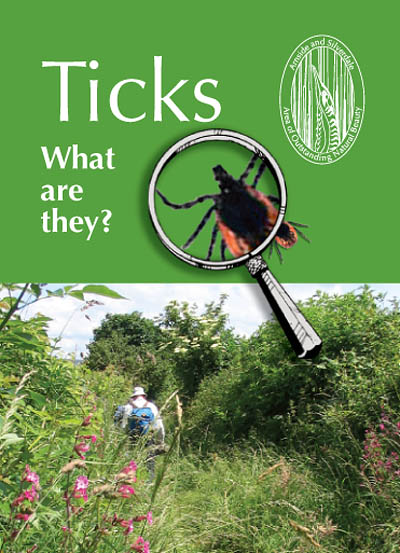 A walk in the country: what could be healthier? Fresh air, exercise, facial palsy, fatigue, arthritis…
A walk in the country: what could be healthier? Fresh air, exercise, facial palsy, fatigue, arthritis…
The tick leaflet produced for walkers
A bite from the increasingly common tick can lead to severe or chronic health problems, including the nasties mentioned above. The bloodsucking distant cousins of spiders can attack walkers in most of Britain and, if left untreated, can cause Lyme Disease.orate the latest advice on ticks.
Having scared you into locking the doors and never venturing out again, it’s time for some reassurance. Not all ticks carry Lyme Disease – they must be infected with the bacteria themselves – and early detection and treatment with antibiotics usually have good results.
However, ticks are a problem which can’t be ignored. Anyone who walks, particularly in vegetated areas, is prone to tick infestation. The British Mountaineering Council has funded the production of a leaflet advising outdoors enthusiasts how to avoid being bitten by the little nuisances, how to check for bites and how to deal with being bitten.
The leaflet has been produced by Arnside and Silverdale Area of Outstanding Natural Beauty and is available for download.
Ticks thrive in areas where deer live and are second only to mosquitoes in the world league table of transmitting disease to humans. They also feed on the blood of birds and other mammals such as sheep and dogs.
Climate change and alterations in farming methods are being touted for the rise in prevalence of the parasites.
It is not always evident that you have been bitten. Ticks are about the size of a poppy seed but swell up as they gorge themselves on your blood. Light coloured clothing helps them be seen or you may want to ask a (very) close friend to subject your body to intimate scrutiny after a walk. Just don’t use grough as an excuse if you end up in court.
Ticks inhabit long grass, bracken, scrub and other vegetation. The risk of picking up the delightful arachnids can be reduced by wearing long trousers and shirts with long sleeves while passing through vegetation, particularly during the peak months, September to October and May to June.
Insect repellents are thought to deter ticks.
We’ve also updated our feature page to incorporate the latest advice on ticks.
Chris Hunt
31 July 2008So the leaflet's available for download, eh? Any chance of you including a link to wherever it can be downloaded from? A link to your updated feature page would be a good idea too.
grough editor
31 July 2008You're quite right Chris, which is why we included them in the first place. The underlined phrases 'avaliable for download' and 'feature page' are both hyperlinks, first to the BMC website where the leaflet is, the second to our feature page.
Chris Hunt
05 August 2008Ah, my fault, for some reason I had my browser (IE6) set to default to "never underline" links. Still, since you don't identify links by any other clue, it might be worth underlining them explicitly in your style sheet: a { text-decoration: underline }